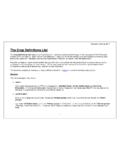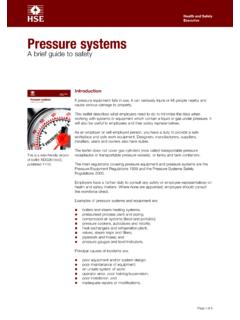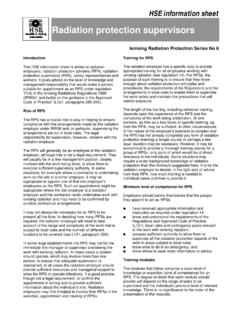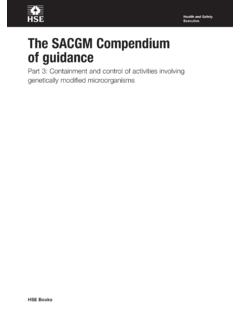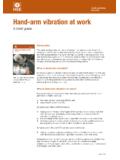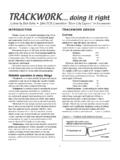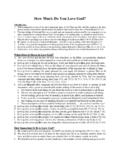Transcription of DEMANDS: ARE YOU DOING ENOUGH? How much work is …
1 DEMANDS: are you DOING enough ? how much work is there? Ensure there are sufficient resources to do the work allocated: o If there are insufficient resources seek guidance from management about priorities. o Support your staff by helping them prioritise or renegotiate deadlines. o Cover workloads during staff absences. o Adjust work patterns to cope with peaks (needs to be fair and agreed with employees). If people are underloaded, think about giving them more responsibility, but make sure that they have been adequately trained. Strike a balance between ensuring that employees are interested and busy, but not underloaded, overloaded, or confused about the job. Develop personal work plans to ensure staff know what their job involves. Are staff able to do the job? Training and development Train staff so they are able to do their jobs.
2 Implement personal development/training plans which require individuals to identify development/training opportunities which can then be discussed with management. Devise systems to keep training records up to date to ensure employees are competent and comfortable in undertaking the core functions of their job. Communication Encourage staff to talk to you at an early stage if they feel as though they cannot cope. Develop a system to notify employees of unplanned tight deadlines and any exceptional need to work long hours. Talk to your team regularly about what needs to be done. This can: o help you understand the challenges the team are currently facing and any pressures they are under; o find ways of sharing the work sensibly and agreeing the way forward with the team; o gain team cohesion and commitment to the work you have planned the team is likely to be more responsive if it understands what needs to happen and by when.
3 Allocating more work to an already stretched team without explanation is unhelpful; o ensure shift work systems are agreed with employees and their representatives and that the shifts are fair in terms of workload; o gain understanding and commitment to unplanned tight deadlines and any exceptional need for long hours; o help you manage any unexpected absences or losses to the team everyone knows the key stages of the project and what each other s role is. Lead by example. How good is the work environment? Have a suitable and sufficient risk assessment to control physical hazards. Further information is available from HSE Infoline: 08701 545500. Assess the risk of physical violence and verbal abuse. Take steps to deal with this in consultation with employees and others who can help (eg the police, charities).
4 Change start and finish times to help employees cope with pressures external to the organisation (eg child care, poor commuting routes). Ensure your risk assessments for physical hazards and risks are up to date. Provide training to help staff deal with and defuse difficult situations (eg difficult phone calls, aggressive members of the public). CONTROL: are you DOING enough ? are you enabling staff to have their say? Give more control to staff by enabling them to plan their own work , make decisions about how that work should be completed and how problems should be tackled (eg through project meetings, one-to-ones, performance reviews etc). Allocate responsibility to teams to take projects forward: o Discuss and define teams at the start of the project. o Agree objectives and goals.
5 O Agree team roles. o Agree timescales. o Agree the provision of managerial support (eg through regular progress meetings). Talk about the way decisions are made within the unit is there scope for more team involvement? are you making full use of employees skills and abilities? Enrich jobs by ensuring that staff are able to use various skills to get tasks completed, and that staff can understand how their work fits into the wider aims of the unit. Talk about the skills people have and if they believe they are able to use them to good effect. How else would they like to use their skills? How much supervision is actually needed? Only monitor employees output if this is essential. Regular meetings with staff could be arranged to see how things are going. At these meetings managers could provide advice and support where necessary and ensure that staff are coping.
6 A supportive environment is crucial. Staff need to know that managers will support them, even if things go wrong or if they find that they are unable to cope with added pressures. SUPPORT: are you DOING enough ? How supportive are you ? Give support and encouragement to staff, even when things go wrong. Encourage staff to share their concerns about work -related stress at an early stage. Hold regular liaison/team meetings to discuss unit pressures. Hold regular one-to-ones to talk about any emerging issues or pressures. Value diversity don t discriminate against people on grounds of race, sex or disability or other irrelevant reasons. Seek examples of how the team would like to, or have, received good support from managers or colleagues can these be adopted across the unit? Ask how employees would like to access managerial support open-door policies, agreed times when managers are able to discuss emerging pressures etc.
7 How do you manage your team s time? Encourage a healthy work -life balance. Encourage staff to take their annual leave entitlement and their meal breaks. Include work -related stress/emerging pressures as a standing item of staff meetings and/or performance reviews. Introduce flexibility in work schedules (where possible) to enable staff to cope with domestic commitments. How well do you listen? Listen to your staff and agree a course of action for tackling any problems it is important for staff to feel that the contribution they make at work is valued. Involve your staff they need to do their bit to identify problems and work towards agreed solutions. Talk about ways the organisation could provide support if someone is experiencing problems outside work . Disseminate information on other areas of support (human resources department, occupational health, trained counsellors, charities).
8 How do you meet the needs of the team? Provide your staff with suitable and sufficient training to do their jobs. Give new staff a proper induction into your team and the organisation. Take account that people s skills and the way they approach the work will differ. Develop individual or unit training arrangements and refresher sessions to ensure training and competencies are up to date and appropriate for the core functions of their job. Offer training in basic counselling skills/access to counsellors. Ensure staff know how to prioritise, or how to seek help if they have conflicting priorities. Provide training on time management, prioritisation, assertiveness etc. RELATIONSHIPS: are you DOING enough ? How well do you deal with unacceptable behaviours? work in partnership with staff to ensure that bullying and harassment never emerge as an issue.
9 One way of DOING this is by having procedures in place, such as disciplinary and grievance procedures, to deal with instances of unacceptable behaviour. In consultation with staff and their representatives, draw up effective policies to reduce or eliminate harassment and bullying. Agree and implement procedures to prevent, or quickly resolve, conflict at work communicate these to employees. Agree and implement a confidential reporting system to enable the reporting of unacceptable behaviour. Communicate the policies and make it clear that senior management fully support them. Communicate the consequences of breaching the policies. Do you work for a caring organisation? Create a culture where members of the team trust each other and can be themselves while they are at work . Encourage your staff to recognise the individual contributions of other team members and the benefits of the whole team pulling together.
10 Encourage good communication and provide appropriate training to aid skill development (eg listening skills, confidence building etc). How well do you build teams? Select or build teams which have the right blend of expertise and experience for new projects. Provide training to help staff deal with and defuse difficult situations. Discuss how individuals work together and how they can build positive relationships. Identify ways to celebrate success (eg informal lunches/wash-up meetings at the end of projects). ROLE: are you DOING enough ? How clear are employees about their role? Make sure your staff have a clearly defined role, eg through a personal work plan which enables them to understand exactly what their roles and responsibilities are. Encourage your staff to talk to you at an early stage if they are not clear about priorities or the nature of the task to be undertaken.

